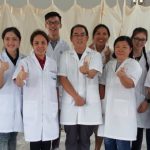The year of 2020 began with hopes and dreams of reaching new heights. Everyone had their resolutions set and every country in the globe had their plans to kick start a fruitful year. But little did we know that we were all heading towards unchartered waters. With the unfolding of the COVID-19 pandemic and the announcement of lockdown and movement control orders, all non-essential services closed down, taking schools and universities with them. As a fourth-year medical student, this meant that I would have to learn medicine, the very core of it being the power of human touch, without getting to see patients. Universities all over the world opted for online teaching and learning activities, leaving students with little to no time to really adjust to this new way of life. The classes that were once conducted at the patient’s bedside while taking history and examining patients right then and there were replaced by online case discussions.
Changing and Coping with Online Learning
While online case discussions are a wonderful way of gaining insight into how to approach a patient and how to treat and manage, it lacks the ability to let us really be part of the experience of taking care of a patient fully. We are deprived of the patient encounter which is without doubt vital to come to a diagnosis. Beginning with the greeting of the patient to the end of the encounter, every second spent with the patient counts. When I was in the wards clerking patients, I tried as much as possible to capture the body language and facial cues of the patient and to spend time really exploring into their histories like we have been trained to do. However, I remember rushing through these encounters numerous times due to various reasons. In those moments what I did not realize was that I was taking that precious opportunity for granted. Now I am left with no choice but to read case histories and clinical examination findings online. From the general inspection to auscultations, from taking the patient’s hand in yours to feel for their pulse to listening as they breathe in and out through your stethoscope, the whole experience is quite frankly a rhythmic melody which we are missing out on due to the pandemic. With the switch to online teaching this wonderful opportunity of experiential learning suddenly came to a standstill, throwing all of us into a new arena of learning and new challenges.
These were definitely necessary precautions but where did that leave us? We certainly yearn for hands-on learning and it is indeed an essential part of our training. These matters left everyone perplexed and worried. And for each individual it meant finding their own ways to cope and navigate through it. In addition to the stress of uncertainty it really started to take a toll on mental health as anxiety and fear were emerging through the surface. This called for immediate actions and meticulous planning to find a way forward as I, just like everyone else had no clue when things were going to return back to normal. As a coping strategy I turned to my favorite pastime, which is reading, not only books but online blogs and journals. I came across the saying “when the fishermen cannot go to sea, they repair their nets” and this saying resonated in my mind for several days. When we are left with no choice but to stay at home, we most certainly have to try to make the best out of it. And since our clinical teaching sessions were at a halt, it really was time for us to get back to strengthening our theoretical knowledge. After all, the eyes cannot see what the mind does not know. With that in mind I carefully planned out and divided my time to accommodate all the postings that I have completed so far. But I was still giving a huge chunk of my time to the current posting and the online classes. A few weeks into this plan, it got too overwhelming and I gradually left behind the previous postings. Having online classes meant that numerous materials needed to be prepared prior to the class and this was both time consuming and stressful. Preparing presentations for a certain topic required careful and thorough understanding of the topic and this required extensive reading for which I found myself not having enough time.
Time Management is Important
This whole experience showed me that time management was definitely going to be an important factor in determining how wisely I use this period of learning from home. With that in mind, I started planning out my day using planners, and started sticking to a schedule for all activities. And this has definitely helped me with coping with the increased workload that everyone faced as a result of enforcement of online learning.
Dedicated Lecturers Delivering Lessons to the Best of their Abilities
Another very interesting revelation that I had during online learning was to see the dedication and efforts of our beloved teachers from all fields to deliver their lessons to the best of their abilities, given the situation. I have always seen how dedicated our professors and lecturers were, but this new way of learning really showed how well most of the lessons were taught and how well the concept of pedagogy was incorporated into teaching.
In a programme where learning by experience is one of the core principles, we really benefit from having individualised time with lecturers where the platform is open for us to probe into how they have handled cases of that particular topic of discussion. This allows us to not only retain the knowledge better, but it also lets us learn from them and how to avoid possible pitfalls when diagnosing and treating patients. Therefore, I believe that online learning really gives us time to ask questions to the lecturers and learn from their experience even if we do not get face to face interaction, we most certainly got invaluable lessons.
Even though our theoretical lessons were wonderfully covered by lecturers and through peer teaching sessions, we still lacked the clinical aspect of medicine. Some of my classmates were fortunate enough to be with their families during the movement restriction order and as advised by many lecturers some physical examinations were possible to be carried out on siblings and other relatives. This was one way to put your hands to work and not let the skills and the art of clinical examination become rustic. For others who did not have this option, and this includes me, we had to again go back to the books and revise on how to do it and we are left with no other option but to wait till we can see our beloved patients or have sessions at the skills lab to be able to practice these skills. These are certainly gravely challenging and very unforeseen circumstances, but we still have to strive to find new means of tackling this issue because without face to face interactions with the patients, peers and our lecturers, it is extremely difficult to get an all rounded clinical education.
Striking a Balance
Looking back at the initial few weeks of online learning, I had the overwhelming feeling of not knowing how to steer my studies in the right direction. Being handed the steering wheel without much supervision, I most certainly would agree that it really takes a lot of effort and much trial and error to find a balance and a way forward with something so very new to us medical students as online learning. But once that balance is found, online learning just might be what we need to really appreciate what we have gotten to experience in our learning environment in the past. Getting to meet patients and sitting down with them to explore their illnesses, getting to do hands-on skills and examinations with such welcoming patients who despite being unwell open their arms and share their most intricate details and let us learn from them were all often times taken for granted. To sum up everything, COVID-19 has tremendously changed the way the entire world functions and brought with it various new opportunities for much needed change. It would be a huge blunder on our part to let this pandemic and its uncertainties get the better of us. Instead of worrying over what we cannot control, we should all take this chance to explore making changes and enhancing our way of living.
Looking Forward to a New Future
This very phenomenon can be applied to medicine as new and promising technologies are emerging, and maybe it really is time to opt for modernized approaches in teaching and learning, and to make full use of all that we have been given. At the end of the day it really comes down to how one reacts and perceives a situation, and that makes all the difference in the world. Train your mind to see good in every situation and take it from there.
Written by Khadheeja Abdulla, IMU Medical Student
The views and opinions expressed in this article are those of the author and do not necessarily reflect the official opinion and views of the University.










